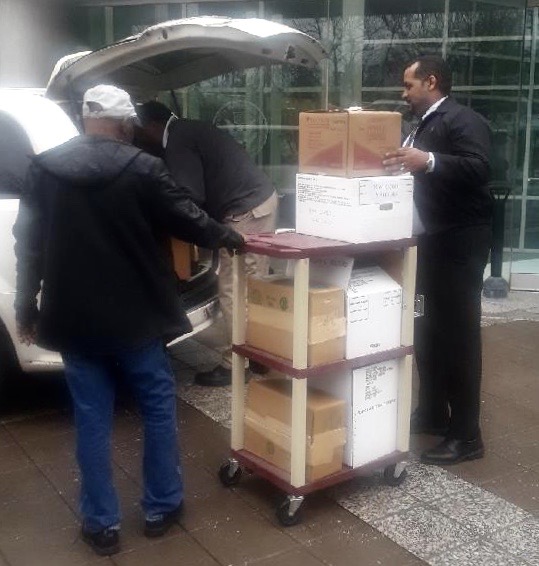
National Archives Donates Protective Gear for COVID-19 Response
By Victoria Macchi | National Archives News
[Update: This story was updated on April 7, 2020, to reflect additional donations made last week by the National Personnel Records Center.]
WASHINGTON, April 1, 2020 — N95 masks, nitrile gloves, gowns, Tyvek suits—these supplies are in high demand across the United States right now, as hospital teams struggle to provide adequate protection for their staff responding to the COVID-19 pandemic.
The same equipment is used by National Archives employees when dealing with damaged records. Now the agency’s supplies are making their way to health care workers, thanks to some quick brainstorming and closet-searching from employees.
In March, the National Archives transferred the supplies to Washington, DC’s Emergency Management Response Team, which in turn is working with the U.S. Department of Health and Human Services to distribute and reallocate the donated supplies.
“We are fighting a war against this virus and need to do what we can,” said Archivist of the United States David S. Ferriero. “We were moved by staffers' suggestions to donate surplus protective supplies. Continuing support from agencies, organizations, and individuals is essential to getting frontline health workers the protection needed to help those who are sick. We are humbled to play a small role in helping at this difficult time.”
Employees at several of the National Archives’ 44 locations across the country are assessing their inventory to make additional donations.
"National Archives staff have been great about identifying supplies that can be used during the current public health emergency," said Chief Operating Officer William Bosanko. "We need to keep a minimal amount for our own use, but other than that, let's work together to get what we don't need into the hands of those working hard to save lives and keep our communities safe.”
Property Management Officer Calvin Shoulders is coordinating the donations with other Federal agencies.
"First responders, doctors, nurses, etc., need this Personal Protective Equipment in order to properly treat the American people, who need help in getting treatment for the COVID-19 virus," Shoulders said. The National Archives, he added, “is a service organization, and we are dedicated to helping internal and external customers, and all Americans."
Scott Levins, Director of the National Personnel Records Center, hand-delivered an additional donation of 200 protective masks to the St. Louis, MO, Veterans Affairs Medical Center behalf of the NPRC, the National Archives at St. Louis, and the Preservation Lab on April 3.
“The staff that received them were extremely appreciative,” Levins said. “They were covered in protective gear head to toe, . . . but they pointed out that the surgical masks they were wearing were inferior to the ones we were donating.”
Similarly, when the University of Iowa Hospital asked for donations of gloves and other supplies, the museum staff at the Herbert Hoover Presidential Library and Museum in West Branch, IA, found spare masks, safety glasses, and other gear to contribute to the medical teams there. Those supplies were delivered last Friday.
The idea to source donations began from a thread on an internal agency message board in March, as employees were in the middle of deciphering when and how t hey would begin to work from home full-time. Preservation and conservation specialists knew that the same gear they use to deal with records damaged by floods, fires, or mold is in short supply at hospitals.
Motion picture preservation specialists Heidi Holmstrom and Audrey Amidon, along with Rachel Bartgis and Vicki Lee of the agency’s Conservation Lab, were among the first employees to discuss possible donations.
Amidon then asked National Archives leadership about the possibility of donating supplies.
“I know what we have is only a drop in the bucket,” she said, “but they're on our shelf and could help save lives.”
National Archives public affairs specialist Miriam Kleiman and writer-editor Victoria Blue contributed to this report from Washington. Writer-editor Sarah Garner contributed from St. Louis.
